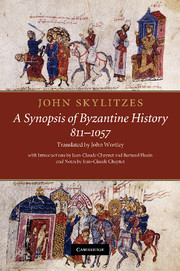Book contents
- Frontmatter
- Contents
- The English translator’s Preface
- Introduction
- Re-writing history: John Skylitzes’ Synopsis historion
- Foreword
- Chapter 1 Michael I Rangabe, the Kouropalates [811–813]
- Chapter 2 Leo V the Armenian [813–820]
- Chapter 3 Michael II the Stammerer [820–829]
- Chapter 4 Theophilos [829–842]
- Chapter 5 Michael III, the son of Theophilos [842–867], and his mother Theodora [842–862]
- Chapter 6 Basil I Kephalas, the Macedonian [867–886]
- Chapter 7 Leo VI the Philosopher (the Wise) [886–912]
- Chapter 8 Alexander [912–913]
- Chapter 9 Constantine VII, Porphyrogennetos [913–959]
- Chapter 10 Romanos I Lekapenos [919–944]
- Chapter 11 Constantine VII [944–959]
- Chapter 12 Romanos II the Younger [959–963]
- Chapter 13 Basil II Bulgaroktonos and Constantine VIII [976–1025]
- Chapter 14 Nikephoros II Phokas [963–969]
- Chapter 15 John I Tzimiskes [969–976]
- Chapter 16 Basil II and Constantine VIII bis [976–1025]
- Chapter 17 Constantine VIII [1025–1028]
- Chapter 18 Romanos III Argyros [1028–1034]
- Chapter 19 Michael IV the Paphlagonian [1034–1041]
- Chapter 20 Michael V Kalaphates [1041–1042]
- Chapter 21 Constantine IX Monomachos [1042–1055]
- Chapter 22 Theodora [1055–1056]
- Chapter 23 Michael VI the Elder/Stratiotikos [1056–1057]
- Glossary
- Bibliography
- Index
- References
Chapter 2 - Leo V the Armenian [813–820]
Published online by Cambridge University Press: 05 July 2014
- Frontmatter
- Contents
- The English translator’s Preface
- Introduction
- Re-writing history: John Skylitzes’ Synopsis historion
- Foreword
- Chapter 1 Michael I Rangabe, the Kouropalates [811–813]
- Chapter 2 Leo V the Armenian [813–820]
- Chapter 3 Michael II the Stammerer [820–829]
- Chapter 4 Theophilos [829–842]
- Chapter 5 Michael III, the son of Theophilos [842–867], and his mother Theodora [842–862]
- Chapter 6 Basil I Kephalas, the Macedonian [867–886]
- Chapter 7 Leo VI the Philosopher (the Wise) [886–912]
- Chapter 8 Alexander [912–913]
- Chapter 9 Constantine VII, Porphyrogennetos [913–959]
- Chapter 10 Romanos I Lekapenos [919–944]
- Chapter 11 Constantine VII [944–959]
- Chapter 12 Romanos II the Younger [959–963]
- Chapter 13 Basil II Bulgaroktonos and Constantine VIII [976–1025]
- Chapter 14 Nikephoros II Phokas [963–969]
- Chapter 15 John I Tzimiskes [969–976]
- Chapter 16 Basil II and Constantine VIII bis [976–1025]
- Chapter 17 Constantine VIII [1025–1028]
- Chapter 18 Romanos III Argyros [1028–1034]
- Chapter 19 Michael IV the Paphlagonian [1034–1041]
- Chapter 20 Michael V Kalaphates [1041–1042]
- Chapter 21 Constantine IX Monomachos [1042–1055]
- Chapter 22 Theodora [1055–1056]
- Chapter 23 Michael VI the Elder/Stratiotikos [1056–1057]
- Glossary
- Bibliography
- Index
- References
Summary
Meanwhile, having assumed the office of emperor, Leo appointed Thomas [‘the Slav’] colonel of the corps of the foederati. This was one of the three men who, as our narrative recorded, accompanied Bardanios when he visited the monk at Philomelion; a young, impetuous man. The emperor made Michael the Stammerer who was godfather to his son and also one of the three, patrician and count of the regiment of the Exkoubitores. As for the other affairs of state, [Leo] disposed of them as he pleased.
Puffed up even more by the recent defeat of the Romans, the Bulgars overran Thrace, laying waste and devastating wherever their foot trod. The emperor decided to send an embassy to initiate peace negotiations, but when the Bulgar rejected the peace proposal with an angry snort, he had no choice but to fight. Accordingly, once the armies were assembled, a violent battle ensued and, again, the Roman forces got the worst of it. The Bulgars fell to pursuing them and the emperor, standing on an elevated site with his retinue, saw what was happening. He realised that, in pursuing the fleeing troops, the Bulgars were not following any plan and that they had completely broken ranks. He therefore rallied the men accompanying him, exhorting them to be of good courage and not to let the reputation of the Romans waste away to nothing. Then he made a lightning assault on the enemy, a move so unexpected that he was able to turn back those whom he encountered and to throw the rest of the Bulgar forces into confusion by this unexpected attack. They were so filled with terror and dismay that nobody gave a thought to valour. Many were those who fell in this attack, including the commander-in-chief, although he was quickly placed in the saddle of a very fast horse by his close associates and was able to save his life by running away. Many more were taken prisoner than fell in the field. This action humbled the high-minded Bulgars while giving new courage to the Romans, whose hopes had been flagging and falling low. [14] Re-entering the capital with illustrious trophies and much booty, the emperor applied himself to the affairs of state.
- Type
- Chapter
- Information
- John Skylitzes: A Synopsis of Byzantine History, 811–1057Translation and Notes, pp. 15 - 26Publisher: Cambridge University PressPrint publication year: 2010

